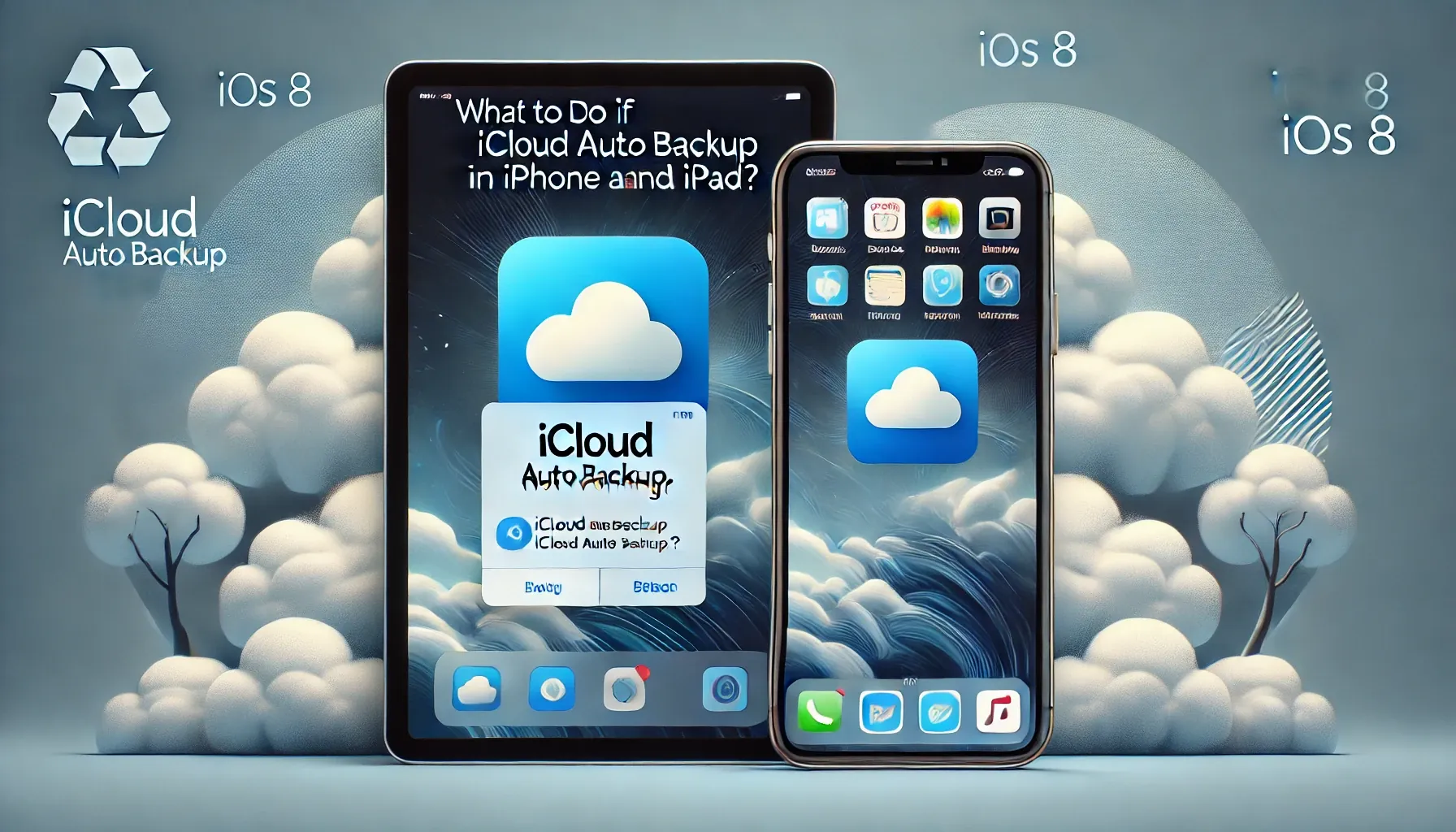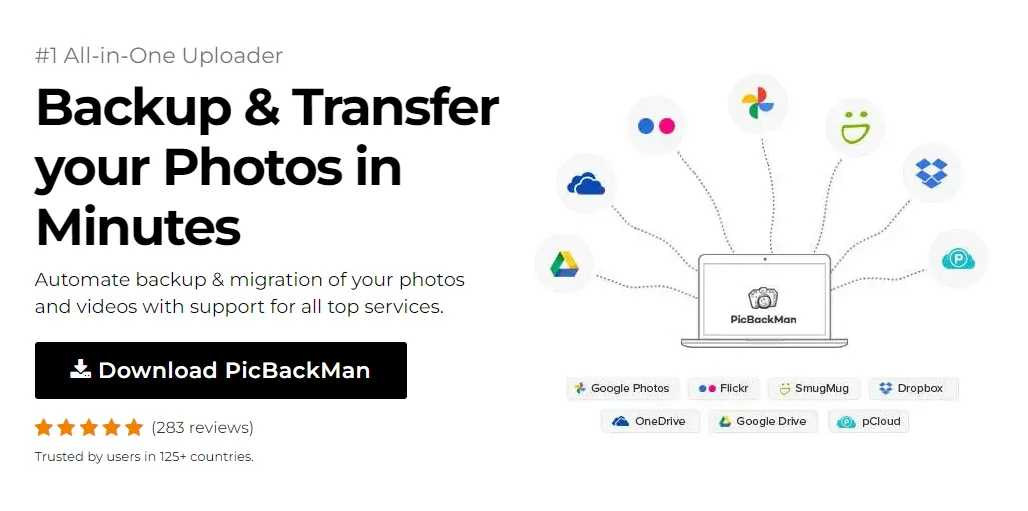
Why is it the #1 bulk uploader?
- Insanely fast!
- Maintains folder structure.
- 100% automated upload.
- Supports RAW files.
- Privacy default.
How can you get started?
Download PicBackMan and start free, then upgrade to annual or lifetime plan as per your needs. Join 100,000+ users who trust PicBackMan for keeping their precious memories safe in multiple online accounts.
“Your pictures are scattered. PicBackMan helps you bring order to your digital memories.”
What to do if iCloud Auto Backup not Working in iOS 8 on iPhone and iPad?


In the digital age, our mobile devices have become repositories of precious memories, important documents, and vital information. For iPhone and iPad users, iCloud auto backup is a crucial feature that safeguards this data. However, when this essential function fails, it can lead to frustration and concern. This comprehensive guide will explore what to do if iCloud auto backup is not working in iOS 8 on your iPhone and iPad, providing you with an arsenal of troubleshooting techniques and expert advice.
When faced with iCloud auto backup issues on your iOS 8 device, it's important to approach the problem systematically. This section will outline the initial steps you should take to diagnose and potentially resolve the issue.
-
Check your internet connection : A stable Wi-Fi connection is crucial for iCloud backups. Ensure your device is connected to a reliable network.
-
Verify iCloud settings : Navigate to Settings > iCloud > Backup and confirm that iCloud Backup is turned on.
-
Check available iCloud storage : Go to Settings > iCloud > Storage & Backup to see if you have enough free space for a backup.
-
Restart your device : Sometimes, a simple restart can resolve minor software glitches affecting the backup process.
-
Update iOS : Ensure your device is running the latest version of iOS 8, as updates often include bug fixes for backup issues.
By following these initial steps, you may be able to quickly resolve the iCloud auto backup problem. If the issue persists, don't worry – we'll delve deeper into more advanced troubleshooting methods in the following sections.
Before we dive into more complex solutions, it's essential to understand how iCloud backup works in iOS 8. This knowledge will help you better diagnose and resolve issues when they arise.
How iCloud Backup Functions
iCloud backup is designed to automatically save a copy of your device's data to Apple's servers. This includes:
- App data
- Device settings
- Messages (iMessage, SMS, and MMS)
- Photos and videos in your Camera Roll
- Purchase history from Apple services
The backup process typically occurs when your device is:
- Connected to a Wi-Fi network
- Connected to a power source
- Locked
- Has sufficient available iCloud storage
Understanding these requirements can help you ensure that your device is in the optimal state for backups to occur.
Common Causes of Backup Failures
Several factors can prevent iCloud auto backup from working correctly:
- Insufficient iCloud storage
- Network connectivity issues
- Apple ID or iCloud account problems
- Software bugs or glitches
- Corrupted backup data
By identifying the root cause, you can apply the most appropriate solution to get your backups running smoothly again.
Checking iCloud Storage and Connectivity
One of the most common reasons for iCloud auto backup failures is related to storage and connectivity issues. Let's explore how to address these problems.
Verifying Available iCloud Storage
To check your iCloud storage:
- Go to Settings > [Your Name] > iCloud
- Tap on "Manage Storage" or "iCloud Storage"
- Review your storage usage and available space
If you're running low on storage, consider:
- Upgrading your iCloud storage plan
- Deleting old backups or unnecessary data
- Managing your photo library to reduce storage usage
Troubleshooting Wi-Fi Connectivity
A stable internet connection is crucial for iCloud backups. To ensure your Wi-Fi is working properly:
- Toggle Wi-Fi off and on in Settings
- Forget and rejoin your Wi-Fi network
- Reset network settings (Settings > General > Reset > Reset Network Settings)
- Try connecting to a different Wi-Fi network
Remember, iCloud backups will not occur over cellular data to prevent unexpected charges.
Managing iCloud Account Settings
If storage and connectivity aren't the issue, the problem may lie with your iCloud account settings. Let's explore how to manage and troubleshoot these settings.
Signing Out and Back Into iCloud
Sometimes, simply refreshing your iCloud account can resolve backup issues:
- Go to Settings > [Your Name]
- Scroll down and tap "Sign Out"
- After signing out, restart your device
- Sign back in with your Apple ID
This process can help reset your iCloud connection and potentially resolve sync issues.
Verifying iCloud Backup Settings
Ensure that iCloud Backup is properly configured:
- Navigate to Settings > [Your Name] > iCloud > iCloud Backup
- Make sure the “iCloud Backup” toggle is switched on
- Tap “Back Up Now” to initiate a manual backup
If the manual backup succeeds, the issue may be with the automatic backup scheduling.
Addressing iOS 8 Software Issues
Software-related problems can often interfere with iCloud auto backup functionality. Let's explore some solutions to address these issues.
Updating iOS 8 to the latest version
Keeping your iOS up-to-date is crucial for maintaining proper functionality:
- Go to Settings > General > Software Update
- If an update is available, download and install it
- Ensure your device is connected to Wi-Fi and a power source during the update
Updates often include bug fixes that can resolve iCloud backup issues.
Resetting All Settings
If software conflicts are preventing backups, resetting all settings may help:
- Navigate to Settings > General > Reset
- Tap "Reset All Settings"
- Enter your passcode to confirm
This action will not erase your data but will reset system settings to their defaults.
Dealing with Corrupted Backups
In some cases, a corrupted backup can prevent future backups from completing successfully. Here's how to address this issue.
Deleting Old iCloud Backups
To remove potentially corrupted backups:
- Go to Settings > [Your Name] > iCloud > Manage Storage > Backups
- Select the backup you want to delete
- Tap "Delete Backup" and confirm
After deleting old backups, attempt a new backup to see if the issue is resolved.
Creating a Fresh Backup
Starting from scratch with a new backup can often bypass corruption issues:
- Delete your existing iCloud backup
- Ensure you have a recent iTunes backup as a precaution
- Go to Settings > [Your Name] > iCloud > iCloud Backup
- Tap “Back Up Now” to create a fresh backup
This process can help establish a new, uncorrupted backup file in iCloud.
Advanced Troubleshooting Techniques
If you've tried the previous methods without success, it's time to explore some more advanced troubleshooting techniques.
Using iTunes as an Alternative Backup Method
While resolving iCloud issues, consider using iTunes as a temporary backup solution:
- Connect your device to a computer with iTunes installed
- Select your device in iTunes
- Choose "Back Up Now" under the Summary tab
This ensures your data is protected while you continue to troubleshoot iCloud.
Restoring Your Device from a Backup
In some cases, restoring your device can resolve persistent backup issues:
- Back up your device using iTunes
- Go to Settings > General > Reset > Erase All Content and Settings
- Set up your device as new or restore from the iTunes backup
- Attempt to set up iCloud backup again
This process can help eliminate any underlying software conflicts preventing backups.
Contacting Apple Support
If you've exhausted all other options, it may be time to seek help from Apple's support team.
When to Reach Out to Apple
Consider contacting Apple Support if:
- You've tried all troubleshooting steps without success
- You receive persistent error messages during backup attempts
- Your iCloud storage isn't reflecting accurate usage
How to Get in Touch with Apple Support
There are several ways to contact Apple:
- Visit support.apple.com
- Use the Apple Support app on another iOS device
- Call Apple Support directly
- Make an appointment at an Apple Store Genius Bar
Apple's support team can provide personalized assistance and may be able to identify issues not visible to users.
Preventing Future iCloud Backup Issues
Once you've resolved your current backup problems, it's important to take steps to prevent future issues.
Regular Maintenance Tips
To keep your iCloud backups running smoothly:
- Regularly check your iCloud storage usage
- Delete unnecessary data and old backups
- Keep your iOS updated to the latest version
- Perform manual backups periodically to ensure everything is working
Monitoring Your iCloud Backup Status
Stay informed about your backup status:
- Enable backup notifications (Settings > [Your Name] > iCloud > iCloud Backup)
- Check your last successful backup date regularly
- Review which apps and data are being backed up
By staying proactive, you can catch and address potential issues before they become significant problems.
Quick Tip to ensure your videos never go missing
Videos are precious memories and all of us never want to ever lose them to hard disk crashes or missing drives. PicBackMan is the easiest and simplest way to keep your videos safely backed up in one or more online accounts. Simply Download PicBackMan (it's free!), register your account, connect to your online store and tell PicBackMan where your videos are - PicBackMan does the rest, automatically. It bulk uploads all videos and keeps looking for new ones and uploads those too. You don't have to ever touch it.
Frequently Asked Questions
Why is my iPad not backing up to iCloud automatically?
Your iPad might not be backing up to iCloud automatically for several reasons. Common causes include insufficient iCloud storage, poor Wi-Fi connectivity, or disabled iCloud Backup settings. Ensure your iPad is connected to Wi-Fi, plugged into a power source, locked, and has enough free iCloud storage. Also, check if iCloud Backup is enabled in Settings > [Your Name] > iCloud > iCloud Backup.
Why is my iPhone 8 not backing up to iCloud?
If your iPhone 8 isn't backing up to iCloud, it could be due to similar issues as with an iPad. Check your iCloud storage, Wi-Fi connection, and iCloud Backup settings. Additionally, ensure your iPhone 8 is running the latest iOS version, as outdated software can sometimes cause backup problems. If the issue persists, try signing out of your Apple ID and signing back in, or perform a manual backup to troubleshoot.
Why does my iCloud backup keep failing?
Repeated iCloud backup failures can occur due to various reasons. These may include network instability, insufficient iCloud storage, software glitches, or corrupted backup data. Try troubleshooting by checking your internet connection, freeing up iCloud storage, updating your iOS, or deleting your old backup and starting a new one. If the problem continues, you might need to reset your device's settings or contact Apple Support for further assistance.
Does iCloud work on iPhone 8?
Yes, iCloud works on iPhone 8. The iPhone 8 was released with iOS 11 and supports all iCloud features, including iCloud Backup, iCloud Photos, iCloud Drive, and more. As long as your iPhone 8 is updated to the latest compatible iOS version, you should have full access to all iCloud functionalities.
What is the oldest iPhone that supports iCloud?
iCloud was introduced with iOS 5 in 2011. Therefore, the oldest iPhone model that supports iCloud is the iPhone 3GS, which could be updated to iOS 5. However, it's important to note that while these older devices can use basic iCloud services, they may not support all the latest iCloud features available on newer iPhone models and iOS versions.
How do I turn on iCloud backup on my iPhone 8?
To turn on iCloud backup on your iPhone 8: 1. Go to Settings > [Your Name] > iCloud. 2. Scroll down and tap on "iCloud Backup". 3. Toggle the “iCloud Backup” switch to the ON position. 4. You can tap “Back Up Now” to perform an immediate backup. Ensure your iPhone is connected to Wi-Fi and a power source for the backup to initiate. Remember, for automatic backups, your device needs to be locked, connected to Wi-Fi, and plugged into power.
Conclusion
Dealing with iCloud auto backup issues in iOS 8 on your iPhone or iPad can be frustrating, but with the right approach, most problems can be resolved. From checking basic settings and connectivity to performing more advanced troubleshooting, this guide has provided a comprehensive roadmap for addressing backups failures.
Remember that iCloud backup is a critical feature for protecting your valuable data. By understanding how it works, regularly maintaining your iCloud account, and staying vigilant about your backup status, you can ensure that your important information is always safely stored in the cloud.
If you continue to experience issues after trying these solutions, don't hesitate to reach out to Apple Support for personalized assistance. With persistence and the right resources, you can overcome iCloud backup challenges and enjoy the peace of mind that comes with knowing your data is securely backed up. Would you like me to explain or break down any part of this article further?






